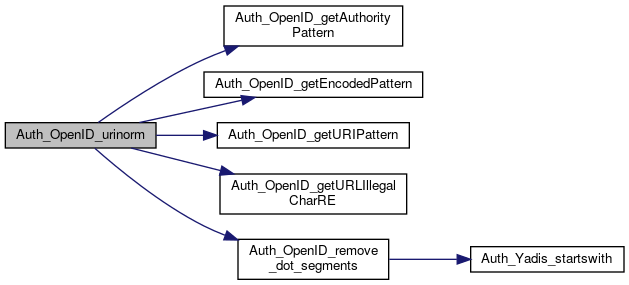Go to the source code of this file.
Namespaces | |
| namespace | OpenID |
| This is the PHP OpenID library by JanRain, Inc. | |
Function Documentation
◆ Auth_OpenID_getAuthorityPattern()
| Auth_OpenID_getAuthorityPattern | ( | ) |
Definition at line 20 of file URINorm.php.
Referenced by Auth_OpenID_urinorm().
 Here is the caller graph for this function:
Here is the caller graph for this function:◆ Auth_OpenID_getEncodedPattern()
| Auth_OpenID_getEncodedPattern | ( | ) |
Definition at line 25 of file URINorm.php.
Referenced by Auth_OpenID_urinorm().
 Here is the caller graph for this function:
Here is the caller graph for this function:◆ Auth_OpenID_getEscapeRE()
| Auth_OpenID_getEscapeRE | ( | ) |
Definition at line 68 of file URINorm.php.
References $n, Auth_Yadis_getIPrivateChars(), and Auth_Yadis_getUCSChars().
 Here is the call graph for this function:
Here is the call graph for this function:◆ Auth_OpenID_getUnreserved()
| Auth_OpenID_getUnreserved | ( | ) |
Definition at line 41 of file URINorm.php.
Referenced by Auth_OpenID_pct_encoded_replace_unreserved().
 Here is the caller graph for this function:
Here is the caller graph for this function:◆ Auth_OpenID_getURIPattern()
| Auth_OpenID_getURIPattern | ( | ) |
Definition at line 15 of file URINorm.php.
Referenced by Auth_OpenID_urinorm().
 Here is the caller graph for this function:
Here is the caller graph for this function:◆ Auth_OpenID_getURLIllegalCharRE()
| Auth_OpenID_getURLIllegalCharRE | ( | ) |
Definition at line 36 of file URINorm.php.
Referenced by Auth_OpenID_urinorm().
 Here is the caller graph for this function:
Here is the caller graph for this function:◆ Auth_OpenID_pct_encoded_replace()
| Auth_OpenID_pct_encoded_replace | ( | $mo | ) |
Definition at line 94 of file URINorm.php.
◆ Auth_OpenID_pct_encoded_replace_unreserved()
| Auth_OpenID_pct_encoded_replace_unreserved | ( | $mo | ) |
Definition at line 80 of file URINorm.php.
References Auth_OpenID_getUnreserved().
 Here is the call graph for this function:
Here is the call graph for this function:◆ Auth_OpenID_remove_dot_segments()
| Auth_OpenID_remove_dot_segments | ( | $path | ) |
Definition at line 99 of file URINorm.php.
References $path, and Auth_Yadis_startswith().
Referenced by Auth_OpenID_urinorm().
 Here is the call graph for this function:
Here is the call graph for this function: Here is the caller graph for this function:
Here is the caller graph for this function:◆ Auth_OpenID_urinorm()
| Auth_OpenID_urinorm | ( | $uri | ) |
Definition at line 142 of file URINorm.php.
References $path, $query, Auth_OpenID_getAuthorityPattern(), Auth_OpenID_getEncodedPattern(), Auth_OpenID_getURIPattern(), Auth_OpenID_getURLIllegalCharRE(), and Auth_OpenID_remove_dot_segments().
Referenced by Auth_OpenID_GenericConsumer\_checkReturnTo().
 Here is the call graph for this function:
Here is the call graph for this function: Here is the caller graph for this function:
Here is the caller graph for this function:










